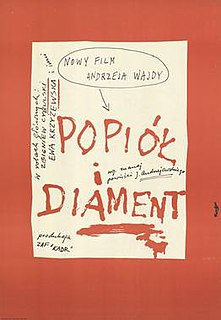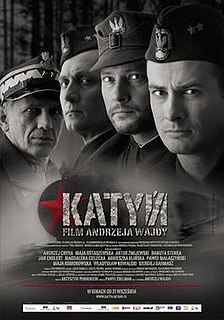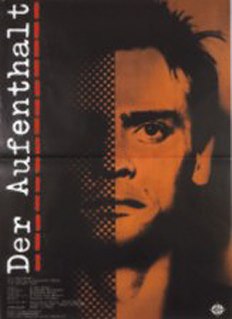
Andrzej Żuławski was a Polish film director and writer. Żuławski often went against mainstream commercialism in his films, and enjoyed success mostly with European art-house audiences.

Andrzej Witold Wajda was a Polish film and theatre director. Recipient of an Honorary Oscar, the Palme d'Or, as well as Honorary Golden Lion and Honorary Golden Bear Awards, he was a prominent member of the "Polish Film School". He was known especially for his trilogy of war films consisting of A Generation (1955), Kanał (1957) and Ashes and Diamonds (1958).

Knife in the Water is a 1962 Polish psychological thriller film co-written and directed by Roman Polanski in his feature debut, and starring Leon Niemczyk, Jolanta Umecka, and Zygmunt Malanowicz. Its plot follows a husband and wife who are accompanied on a boating trip with a young male hitchhiker, who spurs a number of escalating confrontations between the couple.

An Ancient Tale: When the Sun Was a God is a 2003 Polish film, directed by Jerzy Hoffman. The film is based on an 1876 novel, Stara baśń, by Józef Ignacy Kraszewski.

Edges of the Lord is a 2001 film, written and directed by Yurek Bogayevicz, starring Willem Dafoe and Haley Joel Osment. The film, set in Poland during World War II, tells the story of a wealthy Jewish boy who must pose as a Catholic peasant farmland local in order to avoid capture from Nazi forces.

Ashes and Diamonds is a 1958 Polish drama film directed by Andrzej Wajda, based on the 1948 novel by Polish writer Jerzy Andrzejewski. Starring Zbigniew Cybulski and Ewa Krzyżewska, it completed Wajda's war films trilogy, following A Generation (1954) and Kanal (1956). The action of Ashes and Diamonds takes place in 1945, shortly after World War II. The main protagonist of the film, former Home Army soldier Maciek Chełmicki, is acting in the anti-Communist underground. Maciek receives an order to kill Szczuka, the local secretary of the Polish Workers' Party. Over time, Chełmicki increasingly doubts if his task is worth doing.

Pobiedziska is a town in Poznań County, Poland, with 8,209 inhabitants as of the year 2004. It is also the seat of the administrative district (gmina) called Gmina Pobiedziska.

Katyń is a 2007 Polish historical drama film about the 1940 Katyn massacre, directed by Academy Honorary Award winner Andrzej Wajda. It is based on the book Post Mortem: The Story of Katyn by Andrzej Mularczyk. It was nominated for Best Foreign Language Film for the 80th Academy Awards.

The Turning Point is a 1983 East German film directed by Frank Beyer and starring Sylvester Groth, Fred Düren and Klaus Piontek. The film is based on the 1977 novel of the same name by Hermann Kant, which was based on Kant's own experience as a prisoner of war in Poland. The film tells the story of a German prisoner of war at the end of World War II who is wrongly accused of being a war criminal. The film was controversial upon release as Polish commentators criticized that the film showed the Polish army wrongly accusing someone of war crimes. Nevertheless, the film was successful and won several awards and was the East German official submission to the 56th Academy Awards for Best Foreign Language Film.
Na dobre i na złe is a Polish television medical drama series, broadcast on TVP2 since 7 November 1999. It is the longest-running weekly primetime drama on Polish television and one of the longest-running medical dramas in the world. The show revolves around the lives of doctors and patients of a teaching hospital in a fictional town of Leśna Góra near Warsaw.
Generał. Zamach na Gibraltarze is a Polish historical film, based on the last days of General Władysław Sikorski during World War II. It was released in 2009; it was directed by Anna Jadowska; Krzysztof Pieczynski plays General Sikorski.
Career of Nikos Dyzma is a 2002 Polish film directed by Jacek Bromski. The film is a mordant contemporary satire loosely based on the 1932 novel The Career of Nicodemus Dyzma by Tadeusz Dołęga-Mostowicz, which narrates the story of a crude opportunist from the countryside, whose vulgarity, mistaken by the Polish elite in the capital for canny insight, facilitates his rise through the social and political ranks of the nation. The same novel also inspired the 1979 American film Being There.

Suicide Room is a 2011 Polish drama film directed by Jan Komasa. The premiere was held on 12 February 2011 at The Berlin International Film Festival and on 28 February 2011 in Złote Tarasy in Warsaw, Poland. The movie was released in the cinemas on 4 March 2011. The film went on to receive several awards, including those for best actor, best actress, best screenplay and best film.

Małgorzata Pieczyńska is a Polish film and television actress.
Keep Away from the Window is a 2000 Polish drama film directed by Jan Jakub Kolski about a young couple who conceal a Jewish woman in their house during World War II. It was entered into the 23rd Moscow International Film Festival.
Jezioro Bodeńskie is a 1986 Polish film directed by Janusz Zaorski. It won the Golden Leopard at the 1986 Locarno International Film Festival.

Afterimage is a 2016 Polish drama film directed by Andrzej Wajda. It was screened in the Masters section at the 2016 Toronto International Film Festival. It was selected as the Polish entry for the Best Foreign Language Film at the 89th Academy Awards but it was not nominated. It was the Opening film at Indian Film Festival. It is the final film by Wajda who died in October 2016.

Krzysztof Pieczyński is a Polish actor. He appeared in more than fifty films since 1979.
A Grain of Truth is a 2015 Polish film directed by Borys Lankosz, film adaptation of the novel of the same title by Zygmunt Miłoszewski.
Pieczyński is a Polish surname. Notable people with this surname include:













